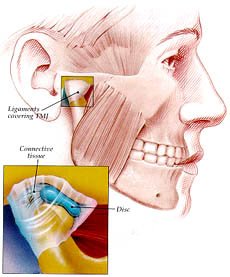 TMJ or temporomandibular joint is located right in front of the ears, right on the spot where the lower jaw and upper jaw meet. Open your mouth and feel the ball and socket joints in front of your ears. Close your mouth. The bones that are moving there are your temporomandibular joints. You see, these joints are used several times in a day. You use it when you eat, speak, yawn, and bite. Indeed, it is one of the most used joints in your body. The TMJ is a very complex joint. It is composed of a complicated array of muscles, bones, and tendons.
TMJ or temporomandibular joint is located right in front of the ears, right on the spot where the lower jaw and upper jaw meet. Open your mouth and feel the ball and socket joints in front of your ears. Close your mouth. The bones that are moving there are your temporomandibular joints. You see, these joints are used several times in a day. You use it when you eat, speak, yawn, and bite. Indeed, it is one of the most used joints in your body. The TMJ is a very complex joint. It is composed of a complicated array of muscles, bones, and tendons.TMJ disorders or problems of these joints do occur. When that happens, stiffness, ear pain, headaches, clicking sounds, bite problems, and locked jaws can be expected. In worse cases, arthritis may also occur. TMJ can cause arthritis if not treated right away. The most usual underlying conditions of TMJ disorders are teeth grinding problems, habitual fingernail biting, too much gum chewing, dental problems, teeth misalignment, jaw trauma, and stress. It is very important that these conditions are addressed right away so that they won’t evolve into arthritis.
TMJ disorders have a set of symptoms. You know you have it if you experience recurring headaches. You would also feel facial pains from time to time. The pain may start on the joints and spread over the head and the face. It could get worse as you open and close your jaw. The contraction of the jaws is painful, more so if you’re exposed to the cold weather or relatively cold surroundings.
Patients of TMJ disorders would also experience ear pain. Half of the people with TMJ will have ear pain without any signs of infection. The pain is usually associated to the joints and it can be felt somewhere below or in front of the ears. If there were no ear drainage or hearing loss associated with the ear pain you’re feeling, then TMJ is the most likely culprit.
TMJ patients can expect to hear clicking, crunching, grinding, or popping sounds when they open and close their mouth. Pain may accompany these sounds too. Dizziness is also likely. People suffering from TMJ may experience balance problems and vague dizziness from time to time.
Tinnitus and fullness of the ear may also occur to people with TMJ disorders. Their ears may feel clogged or muffled. This feeling is compounded during airplane landings and takeoffs. Ear fullness is associated with the dysfunction of the Eustachian tube. Because of the hyperactive muscles in that part on people with TMJ, this symptom becomes almost natural. On the other hand, patients with tinnitus due to TMJ would experience relief from their condition once the joint disorder is resolved.




